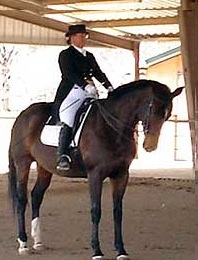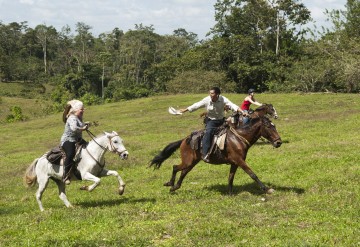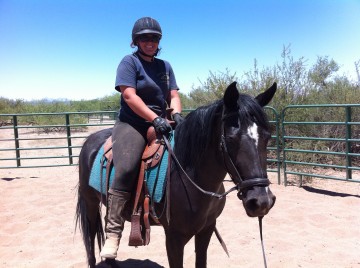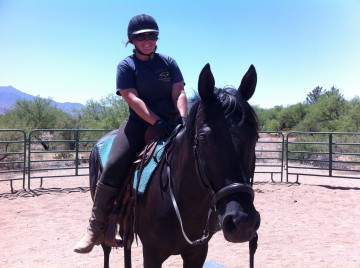In this issue:
The First Ever Eponaquest Riding Apprenticeship
Which Apprenticeship Program is Right for Me?
Announcing the First Eponaquest Riding Apprenticeship
As Linda Kohanov’s new book The Power of the Herd hits stores, bringing horse-inspired wisdom to human leaders, several Eponaquest faculty members have taken the lead in further developing the Eponaquest Apprenticeship Program to address specific needs and interests.
“It’s hard to believe that over the last ten years, we have held 23 apprenticeship classes with over 200 Eponaquest Instructors now operating on five continents,” Linda reports. “In the last four years, we further developed these in-depth facilitator trainings, creating separate apprenticeships for concentrations in personal development, leadership, and equine-facilitated psychotherapy. Thanks to Carol Roush and ML Gould, who have experienced considerable success bringing Eponaquest to Europe, we also have apprenticeships designed specifically to teach our approach to German and French speakers, with future plans for Dutch, Italian, and other non-English-speaking classes. With psychiatrist Nancy Coyne, MD, on our faculty, we also have an option for mental health professionals to learn tools for bringing horse-facilitated work to their clients. All of these apprenticeships focus on non-riding activities to teach human development skills.” (See the next section, “Which Apprenticeship is Right for Me?” for a quick overview of the various programs.)
“And this fall, we will finally be offering an apprenticeship for experienced equestrians who would specifically like to add a riding component to their practices, while becoming Eponaquest Instructors qualified to teach our unique approach to equine-facilitated learning. In this effort, I’m thrilled that our head trainer Shelley Rosenberg will be sharing the many original innovations she developed for riding and training horses with the Eponaquest approach in mind.”

Shelley Rosenberg has been riding since she was nine years old. She started showing American Quarter horses in western pleasure. She competed in show jumping, then landed in the field of competitive dressage. Shelley moved up the ladders of dressage in the early 1980’s, competing in the Olympic festival, and eventually becoming a certified judge.
In the late-1990s, Linda Kohanov became one of her riding students. “It was an honor to study with Shelley,” Linda says. “I knew I had started too late to ever reach her level of expertise in dressage. Even so, Shelley fully supported me in writing my first book The Tao of Equus, which was quite controversial at that time in discussing horses as sentient beings capable of teaching humans a thing or two. Shelley also became one of the founding members of Epona Equestrian Services in 1997. But the one thing I will be eternally grateful for was the way that she respected my dream of rehabilitating the formerly abused stallion Midnight Merlin to live with a herd and mate naturally. Everyone else thought I was crazy at the time. Shelley not only collaborated with me on this unpopular goal, she later went through the Eponaquest Apprenticeship herself, and began absorbing the leadership, personal development, mindfulness, and emotional/social intelligence skills we taught, translating them to riding and training contexts.”

A different way of competing was Shelley’s first change. She began riding in the Dr. Cook’s bit-less bridle at home, and only using the full bridle to compete in. From there, she moved to using just a ring around the horse’s neck, eventually doing all the upper level dressage movements with a mere string around her horses’ necks. During that time, Linda invited Shelley to become the ranch manager at a large farm in Sonoita, Arizona. It became her living laboratory. She worked stallions in the same round pen together, then two stallions and a mare together. She taught all of Kohanov’s school horses to go bridleless, with even the very most beginners on their backs.

Around 2009, Shelley began teaching these skills in clinics around the world, taking this work to Australia, Germany, England, and Ireland. Most recently, she has developed quite a following in Costa Rica, where they now use the ring or bit-less bridle at the country’s largest riding company, Leaves and Lizards. Emphasizing that the horse learns best with a “less is more” approach, Shelley rides one of the stable’s race-horse stallions bridle-less, with just the ring around his neck—with hundreds of other horses around him!
These days, Rosenberg competes for one reason: While she warms up in the dressage holding pen, she uses the bit-less bridle, only putting the bit in when she enters the show arena (bits are required). She merely hopes that one amateur will ask his or her trainer why Shelley can do this and still win, inspiring more people to try the bit-less bridle, a much kinder, softer way of training the competitive horse.

“Shelley started my two youngest horses, Orion and Artemis, under saddle last year with the Dr. Cook’s bit-less bridle,” Linda says. “They love it. How do I know this? Well, they rush over to the fence when they hear Shelley’s truck, clearly excited, obviously looking forward to the adventure and connection they experience being ridden!”
“I see no need to ever put a bit in your horses mouth unless you are competing,” Shelley adds.
After many years of training horses and owners, this has become Shelley’s life’s passion: to show others that even their horses at home can go bit-less, and love riding all the more. She has written two books, My Horses, My Healers and Accessing Your Intuition. Most recently, her article “Build Self-Confidence with Emotional Agility” was featured in the April 2013 issue of Dressage Today magazine.
“I am so very excited about this program,” Shelley says. “Starting this has been a dream for both Linda and myself.” For more information on dates, requirements, and how to apply, see http://eponaquest.com/equine-facilitated-learning-riding-focused/.
Which Apprenticeship Is Right for Me?
As Eponaquest has grown, we have created apprenticeship programs to support facilitators with different interests, qualifications, and goals for employing horses in the work of human development.
Here’s a quick overview of the various apprenticeships and their orientations. (For the pre-requisites needed to qualify to apply, see http://eponaquest.com/apprenticeship/.)
Personal Development:
(Primary Instructor: Linda Kohanov) Teaches the Eponaquest Approach to equine-facilitated learning emphasizing safe, un-mounted activities with horses that facilitate self-reflection, self-mastery, relationship skills, and emotional and social intelligence skills that lead clients to greater self-confidence, creativity, personal empowerment, and satisfaction in life and work. Those who graduate from this program also receive the special designation of POH Instructor (Power of the Herd Instructor) as Linda prepares apprentices to teach the 12 Power of the Herd Guiding Principles introduced in her new book. “In this apprenticeship,” Linda says, “leadership is seen as an advanced form of personal development. After all, when your clients gain confidence in accessing their own creativity and vision, they must develop some leadership skills to manifest that vision.” http://eponaquest.com/apprenticeship/equine-facilitated-learning-personal-development-focus/
Leadership:
(Primary Instructor: Linda Kohanov) Teaches the Eponaquest Approach to equine-facilitated learning emphasizing safe, un-mounted activities with horses that facilitate leadership, team-building, assertiveness, and emotional and social intelligence skills essential to excelling at work, and in other contexts where leadership is a significant factor, such as social activism, community building, educational leadership, church leadership, etc. Those who graduate from the program also receive the special designation of POH Instructor, where apprentices learn how to teach the 12 Power of the Herd Guiding Principles, both at the barn through horse-facilitated activities, and in corporate contexts and phone consultations that further build these skills in purely human contexts. “In this apprenticeship,” Linda says, “some personal development skills are taught in the context helping leaders to recognize and move through personal blocks to success.” http://eponaquest.com/apprenticeship/equine-facilitated-learning-leadership-focus/
Riding:

(Primary Instructor: Shelley Rosenberg. Apprentices will spend the first five days with Linda Kohanov.) Teaches the Eponaquest Approach to equine-facilitated learning with an emphasis on mounted activities with horses. This apprenticeship is for experienced riders and horse trainers who have, or will acquire, safe, solid school horses for mounted work, and/or would like to teach people who have their own horses how to deepen their relationships with their own horses for showing or pleasure riding purposes. http://eponaquest.com/equine-facilitated-learning-riding-focused/
European Personal Development Apprenticeships:
(Primary Instructor: Carol Roush. The first week takes place in the U.S. with Linda Kohanov co-facilitating with Carol Roush. The second and third weeks take place in Germany, France, Holland, etc. where apprentices practice presenting in their native language.) Teaches the Eponaquest Approach to equine-facilitated learning emphasizing safe, un-mounted activities with horses that facilitate self-reflection, self-mastery, relationship skills, and emotional and social intelligence skills that lead clients to greater self-confidence, creativity, personal empowerment, and satisfaction in life and work. http://eponaquest.com/apprenticeship/equine-facilitated-learning-apprenticeships-europe/
Australian Personal Development Apprenticeship:
(Primary Instructors: Shelley Rosenberg and Nancy Coyne. The first week takes place in the U.S. with Linda Kohanov co-facilitating. The second and third weeks take place in Australia.) Teaches the Eponaquest Approach to equine-facilitated learning emphasizing safe, un-mounted activities with horses that facilitate self-reflection, self-mastery, relationship skills, and emotional and social intelligence skills that lead clients to greater self-confidence, creativity, personal empowerment, and satisfaction in life and work. (This apprenticeship is currently in progress. To express interest in joining a future Aussie apprenticeship, contact Shelley Rosenberg at: dressagecenter@theriver.com.)
Mental Health Professionals:
(Primary Instructor: Nancy Coyne, M.D. Apprentices will spend the first five days with Linda Kohanov.) This apprenticeship teaches counselors, social workers, psychiatrists, and other health professionals how to apply the Eponaquest Approach to the mental health field, using safe, un-mounted activities with horses to move through the effects of childhood abuse, adult post-traumatic stress disorder, and another challenges, helping their clients to gain the relationship, emotional and social intelligence skills to lead fulfilling, peaceful, empowered lives. (Contact Nancy Coyne, nancycoyne@me.com, for more information.)